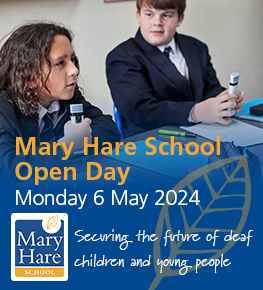BATOD’s role in examinations and testing
One of the prime tenets of Qualified Teachers of Deaf Children and Young People (QToDs) is to raise awareness of the reading difficulties experienced by deaf children and young people. Access to all written forms of assessment has been high on our list of concerns. Read an examination question paper and you begin to wonder what is being tested, actual knowledge or linguistic or decoding skills.
For example:
If you were provided with three black painted metal rods, one of which is known to be made of brass, one of magnetised steel and one of unmagnetised steel, describe how, without scratching the black paint, you would identify each of the rods.
Without much re-ordering or simplifying the question becomes the more accessible:
You have three black painted metal rods. One rod is made of brass, one rod is made of magnetised steel and one rod is made of unmagnetised steel.
Describe how to find out what each rod is made of. You must not scratch the black paint.
No Awarding Body has a deliberate policy of confusing candidates by phrasing questions in obscure language. It is more usually the case that the Awarding Bodies explicitly recognise that a paper aims to test knowledge of its particular subject, not reading ability. However, papers are written by subject specialists who understand the language used!
The development of using language modifiers began with the realisation of the role that can be played by QToDs with experience of prelingually profoundly deaf children. Joyce Sutton was a great crusader on behalf of NATED (National Association for Tertiary Education for Deaf people) and BATOD. Mike Hanson and Jenny Baxter followed closely in her footsteps during the 1980s and made great strides on behalf of deaf candidates in all examination situations. The growing group of QToDs who tactfully reworded questions, offered advice and demystified questions led the way to the success of the BATOD GCSE committee.
Early input and careful negotiations from this group of teachers encouraged Awarding Bodies to accept that these teachers have special expertise to offer and any suggested changes enabled access to the written assessment, not a simplification of the exam system.
Since the SENDA legislation in 2001, the Awarding Bodies started to build this into their procedures for producing papers, not just for deaf candidates but for the benefit of all candidates. The aim has always been to enable any candidate who has difficulty accessing and/or processing language equal access to a written examination paper. In addition, teachers involved in this process must adopt the attitude that their contribution is an agreed part of established procedure, not a favour.
The recommendations in the booklet ‘Language of Examinations’ are considered applicable to all examination papers for any Awarding Body. The principles would apply to any assessment where agreement can be reached. When papers are being modified it is not practicable to organise it with particular candidates or types of candidate in mind. The suggestions have therefore been drawn up with the needs of all prelingually profoundly deaf candidates in mind. Workshops have been organised to assist QToDs develop the necessary skills to a consistent and high standard. Recent research carried out for Ofqual has shown that these suggestions also cover the needs of many other groups of candidates who have difficulty accessing written assessments.
The move now is to encourage teachers of other disability groups to take on board the importance of a professional level of language modification of assessments. To this end BATOD has created a new training course which is helping to ensure that BATOD has a body of well-qualified language modifiers (BATOD accredited Language modifiers – BALMs) who can work with Awarding Bodies to ensure equality of access for all.
A major issue ongoing has been the signing of responses in public examinations. Although the arguments for such a provision would be in keeping with the spirit of the use of an amanuensis, no satisfactory conclusion has been reached about how the needs of such candidates could be accommodated within the examination system, which currently sets out to assess candidates via the medium of English. However, in Scotland responses can be signed. This is an area BATOD will continue to explore with Awarding Bodies following the recognition of British Sign Language in law in Scotland and England, and similar developments likely in Wales and Northern Ireland.
The work of the BATOD GCSE sub-committee had been extraordinarily successful and, even though this sub-group no longer exists, their work continues within BATOD. QToDs are represented, for example, at the Access to Assessment and Qualification Advisory Group meetings and the Access Consultation Forum with Ofqual. In addition, BATOD responds to Ofqual consultations and contributes to the annual revision of JCQ’s ‘Access Arrangements, Reasonable Adjustments and Special Considerations’ – an invaluable document for all teachers working with examination candidates. It is important to remember though, that these considerations are not all relevant to Scotland. BATOD’s co-ordinator of language modification has meetings with JCQ and representatives from the five main Awarding Bodies. This has led to greater awareness of the importance of language modification for all candidates and an attempt to have the majority of papers modified at source – a positive move towards equal access for all. This is an ongoing process with the aim of encouraging Awarding Bodies in all nations, to use BALMs in their examination paper production process.
Examination language feedback form
BATOD is keen to ensure that the quality of the modification of the language of examinations remains high. In order to monitor the quality, it is important that we get feedback. We have designed a simple form which can be used to inform us of colleagues’ opinions – both positive and negative – of the language of examinations with which they have been involved. We would like to propose that services hold professional dialogue meetings to complete these forms together shortly after the exams have been taken if spare copies are available to consult. If not, a meeting just after that year’s papers are online on the exam board’s website would be very helpful. If the BATOD language modification group receives these suggestions from QToDs, it will be possible to make progress with explaining why language modification is necessary to all the Awarding Bodies.
Examination language feedback form
BATOD is keen to ensure that the quality of the modification of the language of examinations remains high. In order to monitor the quality it is important that we get feedback. We have designed a simple form which can be used to inform us of colleagues’ opinions - both positive and negative - of the language of examinations with which they have been involved.Contact information:
Edexcel www.edexcel.org.uk
OCR www.ocr.org.uk
The Assessment & Qualifications Alliance www.aqa.org.uk
Welsh Joint Education Committee www.wjec.co.uk
Northern Ireland Council for Curriculum Examinations & Assessment www.ccea.org.uk
Scottish qualifications authority (SQA) https://www.sqa.org.uk
updated Jan 2024




